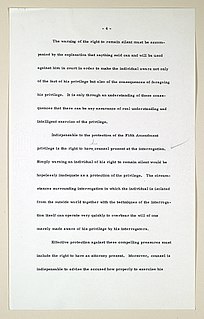The adversarial system or adversary system is a legal system used in the common law countries where two advocates represent their parties' case or position before an impartial person or group of people, usually a judge or jury, who attempt to determine the truth and pass judgment accordingly. It is in contrast to the inquisitorial system used in some civil law systems where a judge investigates the case.
The insanity defense, also known as the mental disorder defense, is an affirmative defense by excuse in a criminal case, arguing that the defendant is not responsible for his or her actions due to an episodic or persistent psychiatric disease at the time of the criminal act. This is contrasted with an excuse of provocation, in which the defendant is responsible, but the responsibility is lessened due to a temporary mental state. It is also contrasted with a finding that a defendant cannot stand trial in a criminal case because a mental disease prevents them from effectively assisting counsel, from a civil finding in trusts and estates where a will is nullified because it was made when a mental disorder prevented a testator from recognizing the natural objects of their bounty, and from involuntary civil commitment to a mental institution, when anyone is found to be gravely disabled or to be a danger to themselves or to others.

In the United States, the Miranda warning is a type of notification customarily given by police to criminal suspects in police custody advising them of their right to silence; that is, their right to refuse to answer questions or provide information to law enforcement or other officials. These rights are often referred to as Miranda rights. The purpose of such notification is to preserve the admissibility of their statements made during custodial interrogation in later criminal proceedings.

The Sixth Amendment to the United States Constitution sets forth rights related to criminal prosecutions. It was ratified in 1791 as part of the United States Bill of Rights. The Supreme Court has applied most of the protections of this amendment to the states through the Due Process Clause of the Fourteenth Amendment.
Gideon v. Wainwright, 372 U.S. 335 (1963), is a landmark United States Supreme Court case in which the Court unanimously held that in criminal cases states are required under the Sixth Amendment of the U.S. Constitution to provide an attorney to defendants who are unable to afford their own attorneys. The case extended the right to counsel, which had been found under the Fifth and Sixth Amendments to impose requirements on the federal government, by imposing those requirements upon the states as well.
Near v. Minnesota, 283 U.S. 697 (1931), was a landmark decision of the US Supreme Court under which prior restraint on publication was found to violate freedom of the press as protected under the First Amendment. This principle was applied to free speech generally in subsequent jurisprudence. The Court ruled that a Minnesota law that targeted publishers of "malicious" or "scandalous" newspapers violated the First Amendment to the United States Constitution. Legal scholar and columnist Anthony Lewis called Near the Court's "first great press case".
Blakely v. Washington, 542 U.S. 296 (2004), held that, in the context of mandatory sentencing guidelines under state law, the Sixth Amendment right to a jury trial prohibited judges from enhancing criminal sentences based on facts other than those decided by the jury or admitted by the defendant. The landmark nature of the case was alluded to by Justice Sandra Day O'Connor, who "described the Court's decision as a 'Number 10 earthquake.'"

Stump v. Sparkman, 435 U.S. 349 (1978), is the leading United States Supreme Court decision on judicial immunity. It involved an Indiana judge who was sued by a young woman who had been sterilized without her knowledge as a minor in accordance with the judge's order. The Supreme Court held that the judge was immune from being sued for issuing the order because it was issued as a judicial function. The case has been called one of the most controversial in recent Supreme Court history.

The open-fields doctrine, in the U.S. law of criminal procedure, is the legal doctrine that a "warrantless search of the area outside a property owner's curtilage" does not violate the Fourth Amendment to the United States Constitution. However, "unless there is some other legal basis for the search," such a search "must exclude the home and any adjoining land that is within an enclosure or otherwise protected from public scrutiny."
Alienation of affections is a common law tort, abolished in many jurisdictions. Where it still exists, an action is brought by a spouse against a third party alleged to be responsible for damaging the marriage, most often resulting in divorce. The defendant in an alienation of affections suit is typically an adulterous spouse's lover, although family members, counselors, and therapists or clergy members who have advised a spouse to seek divorce have also been sued for alienation of affections.
Right to counsel means a defendant has a right to have the assistance of counsel and, if the defendant cannot afford a lawyer, requires that the government appoint one or pay the defendant's legal expenses. The right to counsel is generally regarded as a constituent of the right to a fair trial. Historically, however, not all countries have always recognized the right to counsel. The right is often included in national constitutions. 153 of the 194 constitutions currently in force have language to this effect.
In criminal law, consent may be used as an excuse and prevent the defendant from incurring liability for what was done.

The Fifth Amendment to the United States Constitution addresses criminal procedure and other aspects of the Constitution. It was ratified in 1791 along with nine other articles of Bill of Rights. The Fifth Amendment applies to every level of the government, including the federal, state, and local levels, in regard to a US citizen or resident of the US. The Supreme Court furthered the protections of this amendment through the Due Process Clause of the Fourteenth Amendment.
There are three types of juries in the United States: criminal grand juries, criminal petit juries, and civil juries. In the United States Constitution, juries are mentioned in Article Three and the Fifth, the Sixth, and the Seventh Amendments. Juries are not available in courts of American Samoa established pursuant to the Constitution of American Samoa.

The relationship between BDSM and the law changes significantly from nation to nation. It is entirely dependent on the legal situation in individual countries whether the practice of BDSM has any criminal relevance or legal consequences. Criminalization of consensually implemented BDSM practices is usually not with explicit reference to BDSM, but results from the fact that such behavior as spanking or cuffing someone could be considered a breach of personal rights, which in principle constitutes a criminal offense. In Germany, Netherlands, Japan and Scandinavia, such behavior is legal in principle. In Austria the legal status is not clear, while in Switzerland some BDSM practices can be considered criminal. Spectacular incidents like the US scandal of People v. Jovanovic and the British Operation Spanner demonstrate the degree to which difficult grey areas can pose a problem for the individuals and authorities involved. It is very important to learn the legal status of the right of consent in the judicial statue of the country of resident for the practitioners of BDSM.
The Assistance of Counsel Clause of the Sixth Amendment to the United States Constitution provides: "In all criminal prosecutions, the accused shall enjoy the right...to have the Assistance of Counsel for his defence."
Chambers v. Mississippi, 410 U.S. 284 (1973), was a United States Supreme Court case in which the Court held that a state may not enforce its rules of evidence, such as rules excluding hearsay, in a fashion that disallows a criminal defendant from presenting reliable exculpatory evidence and thus denies the defendant a fair trial.
In the United States, a public defender is an attorney-at-law appointed by the courts and provided by the state or federal governments to represent and advise those who cannot afford to hire a private attorney. Public defenders are full-time attorneys employed by the state or federal governments. The public defender program is one of several types of criminal legal aid in the United States.
Lafler v. Cooper, 566 U.S. 156 (2012), was a United States Supreme Court case in which the Court clarified the Sixth Amendment standard for reversing convictions due to ineffective assistance of counsel during plea bargaining. The Court ruled that when a lawyer's ineffective assistance leads to the rejection of a plea agreement, a defendant is entitled to relief if the outcome of the plea process would have been different with competent advice. In such cases, the Court ruled that the Sixth Amendment requires the trial judge to exercise discretion to determine an appropriate remedy.
State v. A. B. Rhodes, 61 N.C. 453 (1868), was a case in which the Supreme Court of North Carolina found that even though a husband does not have the legal right to whip his wife, the courts "should not interfere to punish him for moderate correction of her", even if there was no provocation for it. The case established that in "determining whether the husband has been guilty of an indictable assault and battery upon his wife, the criterion is the effect produced, and not the manner of producing it or the instrument used."




